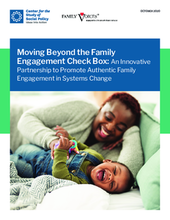Displaying 31 - 40 of 485
Despite the growing need for investment in early childhood development in emergencies (ECDiE), no methodology currently exists to track and report on donor commitments and funding. This report aims to help fill that gap by estimating funding going to ECDiE in recent years.
The purpose of this study was to test the feasibility of an intervention created to stimulate the development of children under the age of seven, living in an institution for children without parental care in Bosnia and Herzegovina. The aim of the intervention was to match each child with one volunteer, trained to deliver three hours per week of individually tailored, play-based activities, for a minimum of one year.
This report sets out the findings from the most comprehensive study of attitudes towards bringing up children from conception to 5 years ever undertaken in the United Kingdom.
The ECDI2030 is a tool, developed by UNICEF, to measure progress toward SDG indicator 4.2.1. It captures the achievement of key developmental milestones by children between the ages of 24 and 59 months. Mothers or primary caregivers are asked 20 questions about the way their children behave in certain everyday situations, and the skills and knowledge they have acquired.
This case study examines the partnership that the Center for the Study of Social Policy (CSSP) and Family Voices undertook to create and implement a process for engaging families in the Pediatrics Supporting Parents (PSP) national initiative to promote the social and emotional development (SED) of young children.
This paper draws upon findings from a study which followed families through the process of pre-birth child protection assessment. It is argued that it is necessary to engage critically with the ‘first three years’ narrative that has become dominant in Scottish policy making and the impact this has had on child protection practice and the lives of families. The paper argues for a broader interpretation of ACEs focused on community and public health across the life course.
The authors of this study applied a sector‐wide analysis protocol that harmonized components of the Humanitarian Programme Cycle by the Inter‐Agency Standing Committee and of a framework to characterize the governance of early childhood development and education (ECDE) systems.
This study seeks to assess the prevalence of childhood neurodisabilities and related neurodevelopmental, emotional, behavioural and intellectual problems (NDEBIPs) among a cohort of children coming into care in an English local authority.
Este documento explora la neuroplasticidad y niños vulnerables.
The aim of the present study was to investigate cognitive functioning at age 8 years among 39 foster children (FC) compared to 36 children in a non-foster comparison group (NFC).




